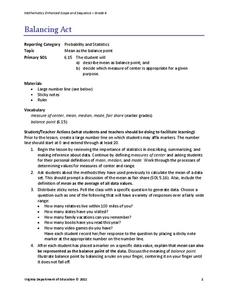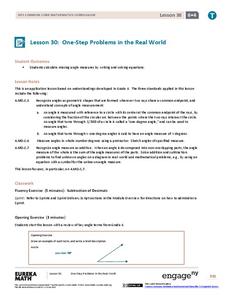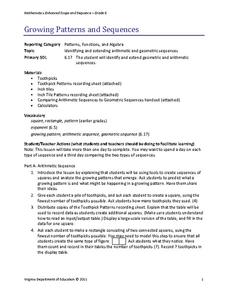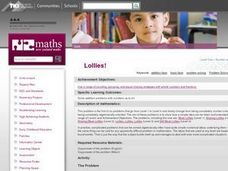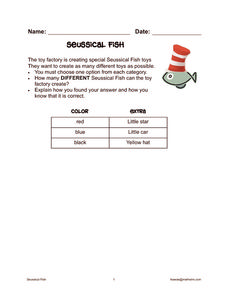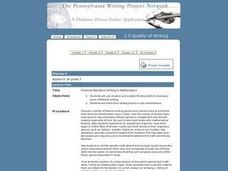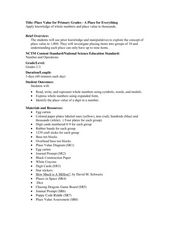Curated OER
Exploring Multiplication and Division at a Party
Students solve multiplication and division problems using Unifix cubes. They explore multiplication and division through equal grouping of objects and sharing. Students discuss the task they completed and share how they completed the...
Curated OER
Convert Whole Number to Roman Number
For this number conversions worksheet, 4th graders read the given whole numbers and then convert those numbers to Roman numerals. Students complete 10 problems.
Curated OER
Volume and Surface Area
In this volume and surface area worksheet, students read about volume and area, then solve a set of problems arranged in increasing order of difficulty.
Curated OER
Primes and Exponents
In this primes and exponents worksheet, students read about prime numbers and their expressions, then work with a group to complete 6 problems.
Virginia Department of Education
Balancing Act
How many different interpretations of the mean are there? Scholars place numbers on a number line and determine the mean. They interpret the mean as the average value and as the balance point.
EngageNY
Graphs of Linear Functions and Rate of Change
Discover an important property of linear functions. Learners use the slope formula to calculate the rates of change of linear functions. They find that linear functions have constant rates of change and use this property to determine if...
EngageNY
Ratios II
Pupils continue the study of ratios by creating ratios from a context. The contexts present more than two quantities, and scholars create contexts that match given ratios.
EngageNY
One-Step Problems in the Real World
Mirror, mirror on the wall, which is the fairest resource of them all? Individuals write and solve one-step equations for problems about angle measurement, including those involving mirrors. Both mathematical and real-world problems are...
Virginia Department of Education
Growing Patterns and Sequences
Learners explore, discover, compare, and contrast arithmetic and geometric sequences in this collaborative, hands-on activity. They build and analyze growing patterns to distinguish which kind of sequence is represented by a set of data...
Science Matters
Finding the Epicenter
The epicenter is the point on the ground above the initial point of rupture. The 10th lesson in a series of 20 encourages scholars to learn to triangulate the epicenter of an earthquake based on the arrival times of p waves and s waves....
Curated OER
Lollies!
Students are shown 4 lollipops and asked to tell you all the ways they could share them between 2 students; understanding the difference between sharing and sharing evenly. They read the math problem and share solutions.
Mathwire
Seussical Fish
Wondering what Dr. Seuss and his colorful fish have to offer your young mathematicians? Find out with this simple yet affective word problem worksheet that challenges children to determine how many different combinations of toy fish can...
Curated OER
Fictional Narrative Writing in Mathematics
Fifth graders discuss variety of fictional writing genres and connect each to familiar story that has been read, use creative and analytical skills to develop original piece of fictional writing that incorporates math skill, and share...
Curated OER
Children's Literature Across the Curriculum Ideas: Chickens Aren't the Only Ones
Young scholars read Chickens Aren't the Only Ones by Ruth Heller. They complete a variety of cross-curricular activities surrounding the study of animals that come from eggs. Included are reading, art, math, science, writing, social...
Curated OER
Children's Literature Across the Curriculum Ideas-You Cheat!
Students read the book, You Cheat! by Jamie Gilson. They complete a variety of cross-curricular activities surrounding sibling relationships and other concepts included in the book. Included are reading, art, math, science, writing,...
Alabama Learning Exchange
Attitude Determines Altitude
A fabulous lesson which combines mathematics with space science. Middle schoolers work in cooperative groups in order to research early astronauts and their accomplishments. They look at a variety of rocket and space shuttle designs, and...
Curated OER
Wants and Needs
Here is an outstanding lesson plan on wants versus needs designed for 1st graders. Pupils listen to the book, Something Good which presents themes on wants, needs, choice, resources, and counting money. Pupils complete worksheets...
Curated OER
City, County, Community
Students explore issues and situations that make for a city and its local environments. In this local government activity, students design maps, define issues and create brochures that illustrate their understandings of these concepts...
Curated OER
Opinion Poll-arities
Students explore the mathematics behind opinion polls, as well as provides a framework for interpreting trends in opinion poll graphics.
Creative Educator
Fantastic Fractions
Groups of learners create an animation illustrating fractions using common objects. They choose everyday objects that they can divide into fractions. They take pictures of the objects dividing into fractions and create an animation with...
Curated OER
Applying Properties to Variables
Eighth graders combine like terms in this properties of variables lesson. Using named items (stars, moons and hearts), they combine like terms using variables. They use the distributive property to combine like terms. Finally, they write...
National Security Agency
Place Value for Primary Grades- A Place for Everything
Here is a phenomenal lesson on place value to the thousands place. Learners construct numbers and identify the value of each digit, investigate building numbers using craft sticks and paper plates, and complete other meaningful place...
Federal Reserve Bank
Your Budget Plan
What do Whoosh and Jet Stream have in common? They are both characters in a fantastic game designed to help learners identify various positive and negative spending behaviors. Through an engaging activity, worksheets, and discussion,...
K5 Learning
Mixed Practice Word Problems #1
Five word problems make up a practice page designed to reinforce subtraction, multiplication, and division. Word problems require scholars to perform operations using numbers up to 1,400.






